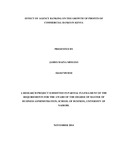| dc.description.abstract | Commercial banks play a vital role in the economic resource allocation of countries in which
they operate. They channel funds from depositors to investors continuously. In order to
effectively carry out the role of financial intermediation, banks need to generate necessary
income to cover the operational cost they incur in the due course. In other words for
sustainable intermediation, banks need to be profitable. Beyond the intermediation function,
the financial performance of banks has critical implications for economic growth of
countries. The Kenyan banking sector has gone through a raft of measures aimed at
reforming the sector to make it more stable and increase financial inclusion. In 2009, the
Central Bank of Kenya commenced measures to open up banking channels to non-bankagents.
An amendment to the Banking Act allowed banks to start using agents to deliver
financial services. This research studied agency banking in Kenya with a view to determining
its effect on the growth of profits of commercial banks in Kenya. An exploratory research
design was used. The study used secondary data. Statistical analysis was done using the aid
of the Statistical Package of Social Sciences (SPSS) software. The selected period was year
2010 to year 2013 (4 years). The target study units for this research were the 13 commercial
banks that had adopted the use of agency banking to roll out financial services to their
customers. The findings revealed that agency banking had a statistically significant effect on
the growth of profit of commercial banks in Kenya. Based on the findings of the study, it can
be concluded that that agency banking has resulted in greater uptake of financial services
which has resulted in more revenues for the banks. It is therefore recommended to the
management of commercial banks and the government continue to do more to increase the
number of agents as a way of improving accessibility of financial services in Kenya and at
the same time enhancing the financial performance of commercial banks. The researcher also
noted that agency banking is lagging behind as only thirteen out of a possible forty three
banks have enrolled the agency banking model, and that their reach and coverage is also poor
as compared to that of mobile banking platforms such as M-Pesa, which has achieved
tremendous reach and growth. The researcher therefore recommends that a further study be
conducted to establish the factors hindering the growth of agency banking model in Kenya as
compared to mobile banking | en_US |

